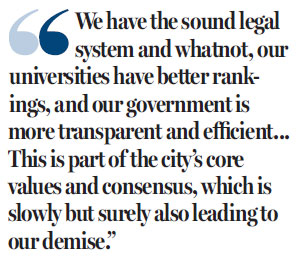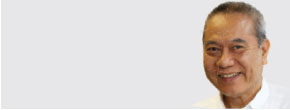Hong Kong should look beyond latest competitiveness rankings
Updated: 2016-06-07 07:41
By Lau Nai-Keung(HK Edition)
|
|||||||||
'Debates about international trade are a study in confusion and misconceptions, in which the 'experts' you see, hear, and read are usually misinformed about the most basic facts and concepts - and in which even those who are fairly sound on the economics do not understand the nature of the debate," economist Paul Krugman once wrote."The discussion of competitiveness is a case in point."
Hong Kong people love to discuss competitiveness. Despite constant concerns that we are losing our edge to mainland and regional rivals, the city has reclaimed the title of the world's most competitive economy, according to the IMD World Competitiveness Center.
The Switzerland-based research institute has been a pioneer in the field of "competitiveness of nations" and "world economy ranking" since it was established 28 years ago. It ranks and analyzes the ability of nations to create and maintain an environment in which enterprises can compete.
The methodology assumes wealth creation takes place primarily at enterprise level, but at the same time enterprises operate in a national environment that enhances or hinders their ability to compete domestically or internationally.
This year's report pushed Hong Kong up one place to the top, saying the city had "encouraged innovation through low and simple taxation and imposed no restrictions on capital flows".

The opening speech by Chief Executive Leung Chun-ying at the opening ceremony of the Internet Economy Summit 2016 echoed the same views. "We are blessed with first-class technological infrastructure. Our mobile subscription rate is among the highest in the world, counting more than two mobile devices per person on average. Our internet connection speed is among the world's fastest, and our household broadband penetration rate exceeds 80 percent," Leung said. "This good base is bolstered by the systems in place that have long made Hong Kong an international business center. I am talking about our sound legal system, robust intellectual property protection regime, free flow of information and our university research talent. All these create a favorable environment in which innovation and technology can flourish."
That's great news! So there must be a lot of recent innovations out there "encouraged" by all these nice things. What about the two Uber drivers that were fined and banned from driving for 12 months after pleading guilty to providing illegal car hires in January? If we were the only place prosecuting Uber drivers, then that would certainly warrant us a top place in some lists.
The mainland has Uber, we have not. That's a manifestation of the strength of the "Two Systems". It's all about differentiation.
So there is nothing for us to worry about. Because Hong Kong has a favorable environment, talented people and capital will come here. All we have to do is sit back and wait. Baidu, Alibaba and Tencent will have their 15 minutes of fame. Here in Hong Kong we have had a favorable environment for innovation ever since we started as an entrepot a century and a half ago.
What else can we possibly do? Have an even lower and simpler system of taxation? Incentivize capital flows, perhaps? Economists have been talking about negative interest rates; we can certainly start thinking about a negative tax rate.
In a separate report on competitiveness also released recently by China's top think tank, the Chinese Academy of Social Sciences (CASS), Hong Kong lost out to Shenzhen for the second year in a row.
Hong Kong people tend to be skeptical about research conducted by mainland institutions. In our collective consciousness, we outperform Shenzhen in all areas. We have the sound legal system and whatnot, our universities have better rankings, and our government is more transparent and efficient. In short, we have the better system, which is capitalism. This is part of the city's core values and consensus, which is slowly but surely also leading to our demise.
|
Lau Nai-keung The author is a veteran current affairs commentator. |
(HK Edition 06/07/2016 page1)
